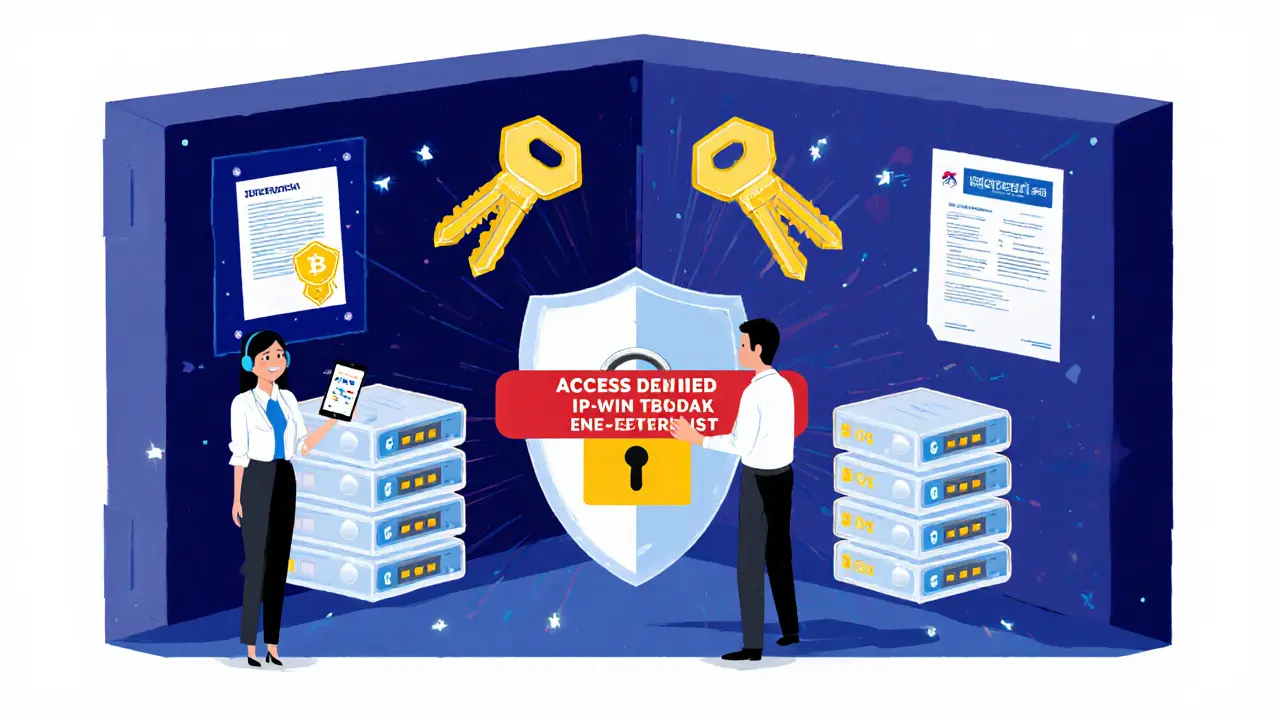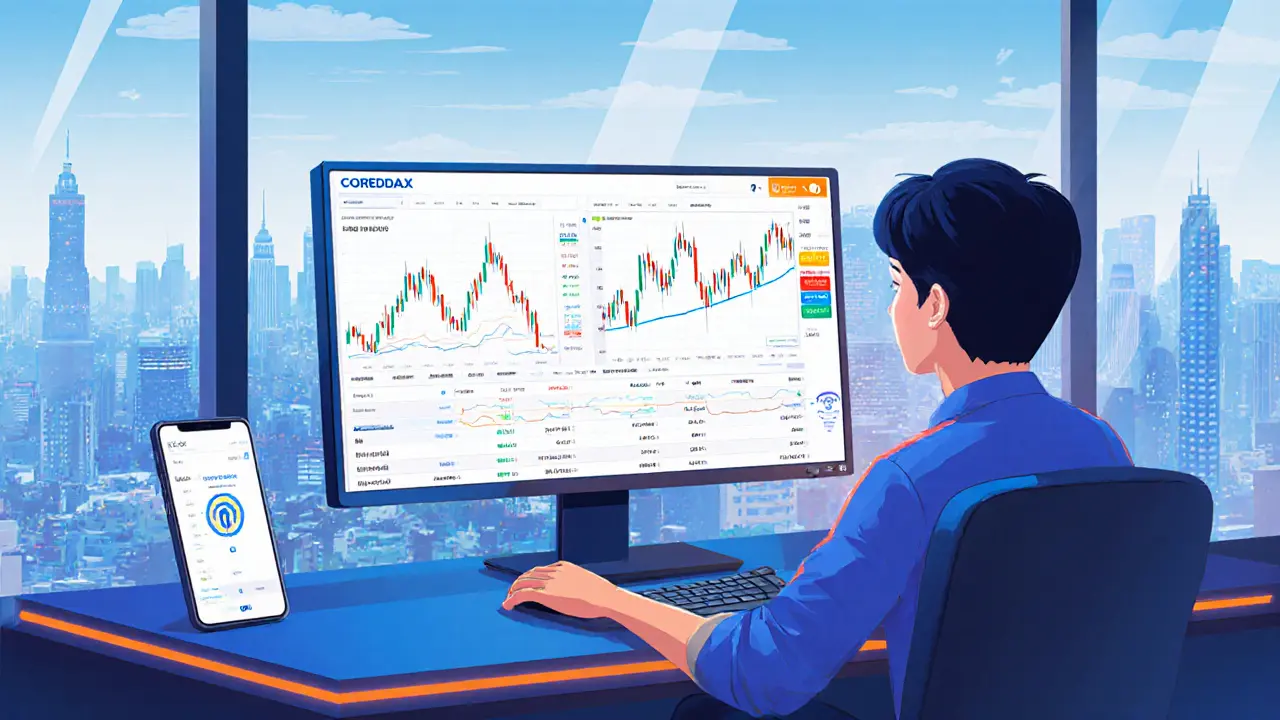BTC Withdrawal Fee Calculator
Calculate Your Withdrawal Cost
Fee Comparison
COREDAX is a South Korean cryptocurrency exchange that launched in 2020 and operates under the country's strict Virtual Asset User Protection Act. It targets Korean retail traders while still offering limited international access. This COREDAX crypto exchange review walks through its trading tools, fee structure, security posture, and where it shines-or falls short-against more global platforms.
Quick Takeaways
- Hybrid desktop‑and‑mobile platform tailored for Korean users.
- Fixed Bitcoin withdrawal fee of 0.001BTC, higher than Binance but lower than most regional rivals.
- No credit‑card fiat on‑ramp; only KRW wire transfers (minimum ₩50,000).
- Strong KYC and compliance, but onboarding can take 30‑45minutes for foreigners.
- Supports 47 cryptocurrencies - far fewer than global exchanges.
Platform Overview and User Experience
The exchange rolls out two fully featured clients. The desktop app runs on Windows10+ and macOS11+, demanding at least a 1366×768 screen. It mirrors the layout seen on many professional desks: order‑book depth, real‑time candlesticks, and a detachable watch‑list. The mobile version, available on iOS14+ and Android8+, adds biometric login and push‑based price alerts. Reviews on Google Play average 4.1/5 from 1,247 ratings, but users note occasional lag during high‑volatility spikes.
Because the UI is entirely Korean‑first, native speakers enjoy polished language support and rapid 24/7 chat response (average 2.3minutes). International users face a steeper learning curve-documentation is only partially translated and English support queues stretch to nearly 19minutes.
Fee Structure Compared to Major Exchanges
COREDAX’s fee model is simple: a flat 0.001BTC fee per Bitcoin withdrawal. Spot trading itself is fee‑free for makers and takers, a common practice among Asian exchanges. Below is a snapshot of how that stacks up.
| Exchange | Withdrawal Fee (BTC) | Crypto Pairs | Fiat Options |
|---|---|---|---|
| COREDAX | 0.001 | 47 | KRW wire only |
| Binance | 0.0005 | 600+ | USD, EUR, KRW, etc. |
| Upbit | 0.0004 | 150+ | KRW, USD via card |
| Coinbase | 0.0005 | 240+ | USD, EUR, GBP, etc. |
While COREDAX’s fee is modest for a regional player, it lags behind the ultra‑low‑cost model of global giants. The limited fiat on‑ramp also hurts conversion speed-wire transfers average 1.8business days versus under a day on Upbit.

Security and Compliance Backbone
South Korean regulation forces exchanges to keep most assets in cold storage, run multi‑sig wallets, and undergo periodic proof‑of‑reserves audits. COREDAX complies with the Virtual Asset User Protection Act, which means KYC is thorough and transaction monitoring is mandatory. Although no public security audit exists, the exchange follows the Cloud Security Alliance’s guidelines-95%+ cold storage, regular penetration testing, and two‑factor authentication.
Recent industry incidents, like the February2025 Bybit hack (reported by Chainalysis), prompted COREDAX to add withdrawal whitelists and optional IP restrictions. These upgrades are mentioned in its September2025 transparency report but lack detailed timelines.
Liquidity, Market Share, and Trading Volume
According to the Korea Blockchain Association, COREDAX ranks fourth in South Korea, commanding roughly 6.2% of the nation’s $3.2billion daily crypto turnover. That places it behind Upbit (52.3%), Bithumb (28.1%), and Korbit (9.7%). Internationally, its market‑making depth is thin; the order book can become thin on less‑traded altcoins, leading to slippage during rapid moves.
Supported Assets and Trading Pairs
COREDAX lists 47 verified tokens, focusing on major coins-BTC, ETH, SOL, and a handful of Korean projects like KLAY and ICON. In contrast, Binance offers over 600 pairs, and Coinbase supports 240+. The narrow selection limits arbitrage opportunities but aligns with COREDAX’s compliance focus-each listed token undergoes a local audit.
Pros, Cons, and Ideal User Profile
Pros
- Regulatory confidence under Korean law.
- Responsive Korean‑language support.
- Flat, predictable withdrawal fee.
- Desktop platform suitable for serious traders.
Cons
- Limited fiat options - KRW wire only.
- English documentation sparse; onboarding can be lengthy.
- Only 47 cryptocurrencies, restricting diversification.
- No public API docs, making third‑party bots hard to integrate.
The exchange fits Korean residents aged 25‑44 who prioritize compliance and local language. International traders looking for fast fiat on‑ramps or a vast token list may find better fits elsewhere.
Future Outlook
Regulatory consolidation looms. Analysts at Nomura Financial Insights estimate an 68% chance COREDAX survives the 2026 tightening, provided it raises additional capital and expands beyond KRW‑only deposits. The industry is also eyeing quantum‑resistant cryptography by 2027, a move COREDAX will likely need to adopt to stay compliant.
In the short term, the platform may roll out more English help‑pages and consider partnerships with payment processors to lower onboarding friction. Until then, its niche strength remains the Korean market’s demand for a tightly regulated, Korean‑centric trading hub.
Frequently Asked Questions
Is COREDAX safe for storing cryptocurrency?
Yes. COREDAX follows South Korea’s Virtual Asset User Protection Act, keeps most assets in cold storage, uses multi‑signature wallets, and requires two‑factor authentication. While no public audit exists, its compliance framework is stricter than many offshore platforms.
What fiat currencies can I deposit?
Only Korean Won (KRW) via bank wire transfer. The minimum deposit is ₩50,000 (about $38 USD). Credit‑card or PayPal deposits are not supported.
How does COREDAX’s Bitcoin withdrawal fee compare?
COREDAX charges a flat 0.001BTC per withdrawal, which is higher than Binance’s 0.0005BTC but lower than many regional exchanges that charge a percentage‑based fee.
Can I trade on COREDAX using an API?
Public API documentation is limited and primarily in Korean. Third‑party bot integration is possible but requires manual setup and is not officially supported.
What is the typical verification time for an international user?
International KYC can take 30‑45minutes, assuming passport scans and notarized translations meet the platform’s format requirements. Some users experience longer delays if documents are rejected.


All that Korean regulation is just a clever way to keep the real owners in the dark.
For non‑Korean speakers the exchange does provide a handful of English pages, but the bulk of the help documentation stays in Hangul, so a translator becomes necessary for the deeper settings.
Wow, the Korean market really loves its home‑grown platforms! It’s like watching a national drama where every new feature is a plot twist, and the local traders are the enthusiastic audience cheering from the sidelines.
COREDAX presents an interesting case study in how tightly regulated environments shape the user experience.
On the positive side, the mandatory cold‑storage policy dramatically reduces the risk of large‑scale theft, something many Western exchanges still grapple with.
The platform’s desktop client, while visually reminiscent of professional trading suites, is built with a Korean‑first mindset, which means all menu labels and tooltips are initially in Korean before any English overlay appears.
This design choice benefits local traders by reducing friction, yet it inadvertently raises the entry barrier for international users who must navigate a semi‑translated interface.
Moreover, the KYC process, although thorough, can feel intrusive to foreigners because it demands notarized translations of passports and additional proof of residence.
Nonetheless, the verification speed is respectable, often completing within thirty to forty‑five minutes when documents are correctly formatted.
Regarding fees, the flat 0.001 BTC withdrawal charge is simple to understand, but it does not scale with market conditions, which can be a disadvantage during periods of high network congestion.
Trading fees being zero for both makers and takers is generous, yet the limited selection of 47 assets means many traders will quickly outgrow the platform’s offerings.
Liquidity on less popular altcoins can be thin, leading to noticeable slippage during volatile spikes, a situation that seasoned traders should keep in mind.
The exchange’s compliance with South Korea’s Virtual Asset User Protection Act ensures regular audits and multi‑signature wallets, fostering a sense of institutional confidence.
However, the lack of a publicly available security audit leaves a small but important transparency gap that some cautious investors might find unsettling.
Support response times are impressive for Korean users, averaging just over two minutes, but English‑speaking customers may experience nearly twenty minutes of waiting before receiving assistance.
From a strategic perspective, COREDAX’s focus on the domestic market may protect it from the intense regulatory battles seen in the broader global crypto arena.
Looking ahead, the platform’s survival will hinge on whether it can expand its fiat onboarding options beyond KRW‑only wires, a move that could attract more international capital.
If the exchange manages to broaden its token list while maintaining stringent compliance, it could carve out a niche as a secure gateway for Korean‑centric crypto investment.
In summary, COREDAX excels in regulatory robustness and localized user support, but its limited asset range and fiat pathways make it a specialized tool rather than a universal solution.
The cultural emphasis on security definitely resonates with Korean traders, and it’s refreshing to see a platform prioritize compliance over flashy marketing.
Spot trading being fee‑free is a nice perk, but the real cost comes from the withdrawal fee and the slow fiat onboarding, which can erode profits for high‑frequency users.
Your overview accurately captures the trade‑off between regulatory safety and limited asset diversity.
Honestly, the platform feels like a cozy Korean coffee shop for crypto – comfy for locals but a bit confusing for tourists 😅.
Yo, if you’re not ready to wrestle with Korean paperwork, you might as well stay home and watch the market from your couch.
In terms of API integration, the scarcity of English docs translates to higher latency in bot deployment, which could impact your order execution latency metrics.
Sure, because who doesn’t love waiting two weeks for a KRW wire to clear while the market does a 180‑degree spin 🙄.
When you look at COREDAX, you see a microcosm of how governance shapes technology – the rules dictate the user flow as much as the code does.
That perspective helps remind us that every regulatory hurdle is also an opportunity to build stronger user trust.
If you’re considering COREDAX, start by preparing all required documents in Korean format; that prep work smooths the KYC queue and gets you trading faster.
looks like a solid option for locals but not sure its worth the hassle for outsiders.
Oh great, another exchange that limits you to KRW – exactly what the global market needed, said no one ever.
People should think twice before using a platform that hides its audit reports, thats just reckless.
Honestly, dropping the ball on transparency is a red flag that outweighs any fee advantage.